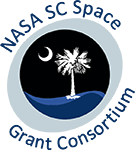Graduate Research Fellowship (GRF)
APPLY HERE: GRF ApplicationAll applications will be due by midnight on Monday, January 26, 2026.
Faculty Letters of Recommendation are due Monday, February 2, 2026.
*Please note: Faculty may be the primary mentor for no more than 3 students in all of our student programs.
*NASA Media Release form – download here: NASA-AdultMediaReleaseForm 2
Blank budget form: Blank-Budget
Purpose
The Graduate Research Fellowship (GRF) is designed to help meet the continuing needs of the aeronautics and space effort by increasing the number of highly trained scientists and engineers in aerospace, space science, space applications and space technology. The GRF Program awards assistantships for graduate study leading to research-based masters or doctoral degrees in the fields of science, mathematics, and engineering.
Fellowships
Fellowship money awarded by the SC Space Grant Consortium will be administered through the your institution’s Grants and Sponsored Programs Offices. Indirect charges (IDCs) are NOT ALLOWED on any SC Space Grant student awards. A maximum of $16,000 will be awarded from the SC Space Grant Consortium, which must be matched 1:1 by the host institution with non-federal funds, the total being applied toward a graduate assistantship, totaling $32,000. In an effort to make the fellowship prestigious, one with the potential to attract and hold the best and brightest students, a requirement is that the stipend amount of $26,000 out of $32,000. A signature from the official responsible for committing the institution is required for the application.
Eligibility
All applicants must be either full-time graduate students enrolled in an accredited consortium member institution or an applicant for full time admission to a Masters or Doctorate program in an accredited consortium member institution. Applicants must be citizens of the U.S. (see U.S. citizenship requirements here). An individual accepting this award may not concurrently receive other Federal fellowships or traineeships.
Proposal Requirements
Proposals for the GRF must be written by the student. Continuing students are advised to enlist the aid of their faculty advisor for guidance, review, and commentary on the written material prior to submission. Students who have applied for admission to graduate school, but have not begun their first semester, must identify a faculty member who has agreed to be their faculty advisor and who can provide a written description of the proposed research and a budget. Required components include:
- Resume
- Education Information to include unofficial transcripts
- Faculty Advisor Information
- Research Proposal (no more than 3 pages-references not included in page count):
- General outline of the project
- Research methods to be used
- Goals and expected results
- Project timeline
- Relevance to NASA
- 1 letter of recommendation, which MUST be from your faculty member research project mentor who will oversee your project. A post-doc or PhD student is not eligible to submit this letter.
Faculty Letters of Recommendation are due Monday, February 2, 2026.
-
References are outside of the 3-page limit.
- Research Term
Awarded for a period of one year starting in either May or August (prorated if anticipated tenure is less than 12 months). You must perform 350 hours, or more, on the research project. - Application Type
New or Renewal – renewals are available on a competitive basis for a total of three years, contingent on the availability of funds and on satisfactory progress as reflected in performance evaluations. For Renewals—please include a paragraph detailing your current project outcomes and the importance to NASA of receiving a renewal. - Budget
The total annual requested amount (SC Space Grant + institutional, non-federal match) cannot exceed $32,000. This amount should include the student’s annual stipend, not less than $26,000/year and may also include an allowance for additional research-related expenses, not to exceed $6,000. A short justification should be included. Describe who is providing the matching funding, such as the department or the dean’s office. The allowance may be used to help defray tuition costs, purchase books and software, or to provide per diem and travel for the student. Requests for the allowance must be fully justified. Alternative uses for this allowance may be requested but must be consistent with the intent of the program. Funds awarded through the SC Space Grant Consortium must be applied towards the student stipend only. The required 1-to-1matching funds may be applied towards the student’s stipend and allowance. A signature from the official responsible for committing the institution is required for the application. This may be a dean, department chair or grant office adminstrator. *Indirect charges (IDCs) are NOT ALLOWED on the Graduate Research Fellowship.
Proposal Formatting Guidelines:
• Must be single-space, in English, use a font of at least 12 point (no more than ~15 characters per inch horizontally and 5.5 lines per inch vertically)
• Must use standard 1” margins on all sides
• 10 mb file size max for each proposal, must be an unlocked and searchable pdf file
Reporting Requirements
- SC Space Grant Awardees are required to submit a final report of their research activities at the end of the research term.
- SC Space Grant Awardees are required to present their work at a research symposium or conference.
- If selected to participate in this program you agree to participate in the South Carolina Space Grant Longitudinal Tracking program that is designed to monitor student progress from award through first employment.
For more information, please contact: Ms. Tara B. Scozzaro, MPA Program Manager
phone: 843.953.5463 | email: [email protected]

